At the ultimate outsider football tournament, the not-quite-official team of a not-quite-independent country tries to make its mark.
“SAH-MAH-LEE, SAH-MAH-LEE, SAH-MAH-LEE!”
It was an incongruous chant from the small crowd at a rudimentary soccer field nestled between the Caucasus Mountains and the Black Sea, but one that over the week would be regularly and passionately echoed from the stands. The Somaliland National Football Team, a gregarious squad representing a controversial disputed territory in East Africa, made up mostly of the children of refugees living in Europe, had become the hometown team of Gagra, a past-its-prime resort town in the similarly controversial and disputed pseudo-state of Abkhazia.
Unfortunately for the fans in Gagra though, the local heroes were not a very good team, and they were not good in the most frustrating possible way for their supporters. It’s one of the worst clichés of sports writing to say that a game was closer than the score indicated. It’s a tougher case to make when the sport is soccer and the score is 5-0. There were, however, moments in the group stage match of the 2016 ConIFA World Football Cup, played on a muggy overcast day in Gagra, where it very much looked like the Somaliland team could have beaten Panjab, but through a combination of lack of coordination, poor conditioning, and sloppy mistakes, the game slipped out of reach.
“They looked like athletes. We look like we just strolled onto the pitch for a kickabout,” said the shell-shocked goalkeeper Abdinaser Dualeh, without whose heroic efforts the score would have been even more lopsided.
“That’s football, ennit?” was all an exhausted and demoralized Guled Egal, a semi-pro player from Bristol, could muster as he trudged off the field.
Regardless of the score, as the two teams made their way first to their locker rooms, then toward the bus back to the hotel, it was the Somalilanders, not the Punjabis, who were mobbed by local kids seeking autographs and selfies. A few gave away their sweaty jerseys and scuffed shin-guards to the fans.
Somaliland had been knocked out of contention, but the tournament would continue for another five days. The players were looking forward to a few more days of being tourists in Abkhazia. But in the sort of twist you never get in larger, more organized tournaments, it turned out the squad was not quite done. Unbeknownst to all the players, the losing teams from each group in the competition would play each other to determine ConIFA’s final rankings. Team director Ilyas Mohamed only learned in a postgame press conference that while Somaliland wouldn’t be going home with a trophy, it would have two more chances to get its act together.
“Relieved,” Mohamed told me when I asked how he felt on the bus back to the hotel. “We have a chance for redemption.”
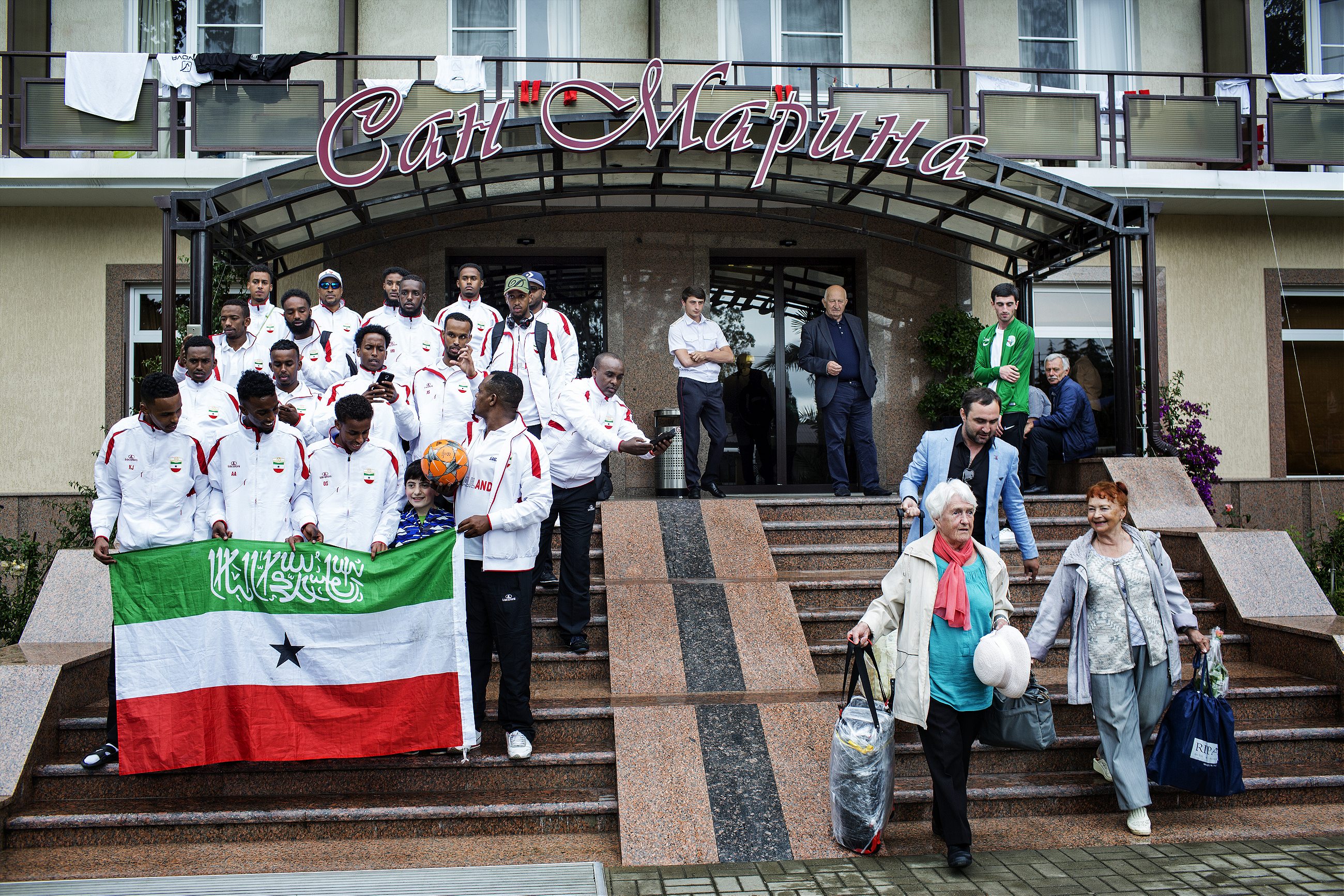
Somaliland is not, technically speaking, a country, at least not in the eyes of the rest of the world’s governments. Neither is Panjab, Abkhazia, or any of the other nine teams competing in the 2016 World Football Cup organized by the Confederation of Independent Football Associations, a soccer federation for unrecognized nations.
We may live in a world divided into nation-states, but the definition of statehood is often ambiguous. The traditional definition under international law is that a state is an entity that has a permanent population, a defined territory, a government, and the capacity to enter into relations with other states. But the truth is that the definition of statehood within the current international system is circular: to be recognized as a state by other countries, other countries have to recognize you.
In the context of the World Football Cup, another useful definition comes from noted international relations scholar Frank Zappa: “You can’t be a real country unless you have a beer and an airline—it helps if you have some kind of football team, or some nuclear weapons, but at the very least you need a beer.” Abkhazia has no airline—the Georgian government won’t allow commercial flights into the territory and Sukhumi’s airport is used only by the Russian military—and certainly no nuclear weapons. But it does have a light national lager—Sukhumskoe—and an impressive football team. Devoutly Muslim Somalilanders don’t drink alcohol, but now they at least have a football team.
ConIFA is where “nations,” in the cultural rather than political sense, compete when they don’t meet the threshold of statehood required for membership in bodies like FIFA, the IOC, or for that matter, the UN General Assembly.
Some—like Raetia, representing the Romansh speakers of Switzerland, or Padania, representing Northern Italy—are cultural groups and minorities seeking ways to preserve a distinctive culture or language against the homogenizing forces of modernity. Others are places like Kurdistan or Abkhazia that enjoy de facto independence but not wide international recognition due to any number of geopolitical factors.
For the latter, ConIFA is hopefully a stepping stone to eventual membership in FIFA. Their secondary status can feel particularly frustrating, as world soccer’s premier governing body has fairly vague criteria for membership. FIFA’s rolls include some tiny, only semi-independent places like Montserrat, an island in the Caribbean, and Niue, a territory 1,500 miles northeast of New Zealand in the South Pacific. Palestine is in FIFA, though not a member of the United Nations. As of May, so is Kosovo. The admission of the U.S.-backed Balkan state is particularly galling for Abkhazians, where the Kosovo precedent is invoked almost constantly to demonstrate Western hypocrisy in not recognizing their own sovereignty.
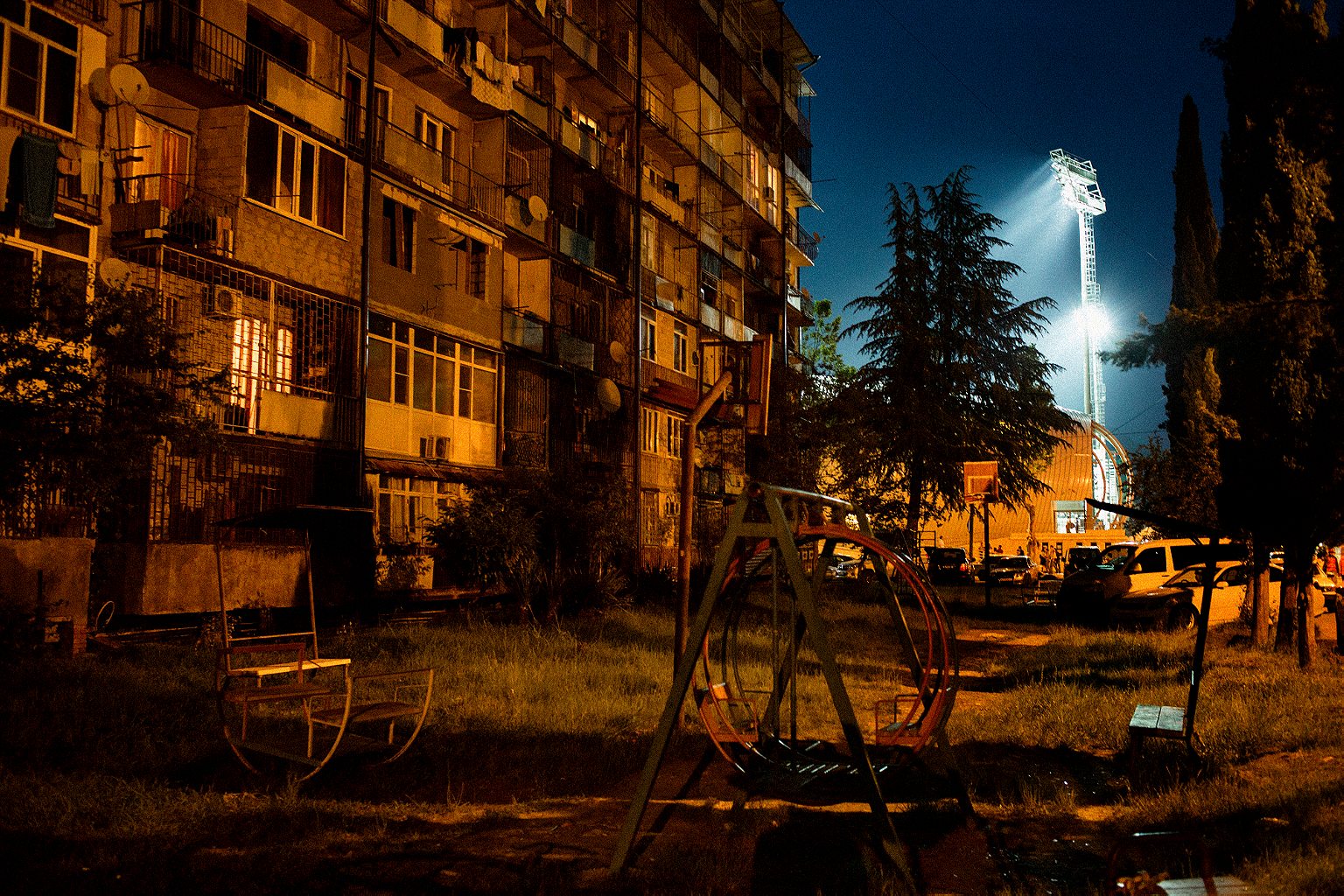
ConIFA was formed in 2013 following the collapse of a similar organization called the N.F.-Board. Its president, Per-Anders Blind, is a Swedish business developer and former football referee. An ethnic Sami, the indigenous people of northern Scandinavia, Blind told me, “I feel really closely connected to the teams. I have a huge respect and understanding of their background and struggle and their fight for their right to exist.”
Most of the organizational work seems to be done by General Secretary Sascha Düerkop. A friendly, chain-smoking German mathematician with an asymmetrical haircut and an impressive football shirt collection, he became involved in the organization when he started seeking out jerseys from non-FIFA teams. “Before we built ConIFA, I had never heard of Abkhazia,” he said.
ConIFA currently has 35 members—and no, you can’t just declare your local pub an independent nation and start a football team. New members are decided on by vote of the existing members and generally have to be semi-autonomous states or minority groups recognized by international NGOs. Still, a few members, such as Cascadia, a region of Oregon, Washington, and British Columbia, seem borderline to me.
The first, much smaller, ConIFA World Football Cup was hosted by the Sami and held in the Swedish city of Östersund in 2014. Düerkop said Abkhazia was chosen after a bidding process over another unrecognized ex-Soviet territory, Nagorno-Karabakh. That turned out to be a wise decision as the long dormant conflict there has recently heated up again.
Düerkop was very satisfied with the choice. “The whole set-up was pretty easy for us compared to Sweden. There, we had a lot of hassles about visas. It’s really a pain in the ass to get visas for Darfuri refugees, for example. Here, we have the support of the president. So getting the Abkhazian visas was no problem, and they have a strong connection with Russia, so getting those visas was no problem either.”
But holding an international football tournament in an unrecognized state presents some complications. One team, the Isle of Man, decided not to attend after the British government advised the players against travel to the breakaway region, and a team representing the Roma dropped out just weeks before the competition due to visa complications.
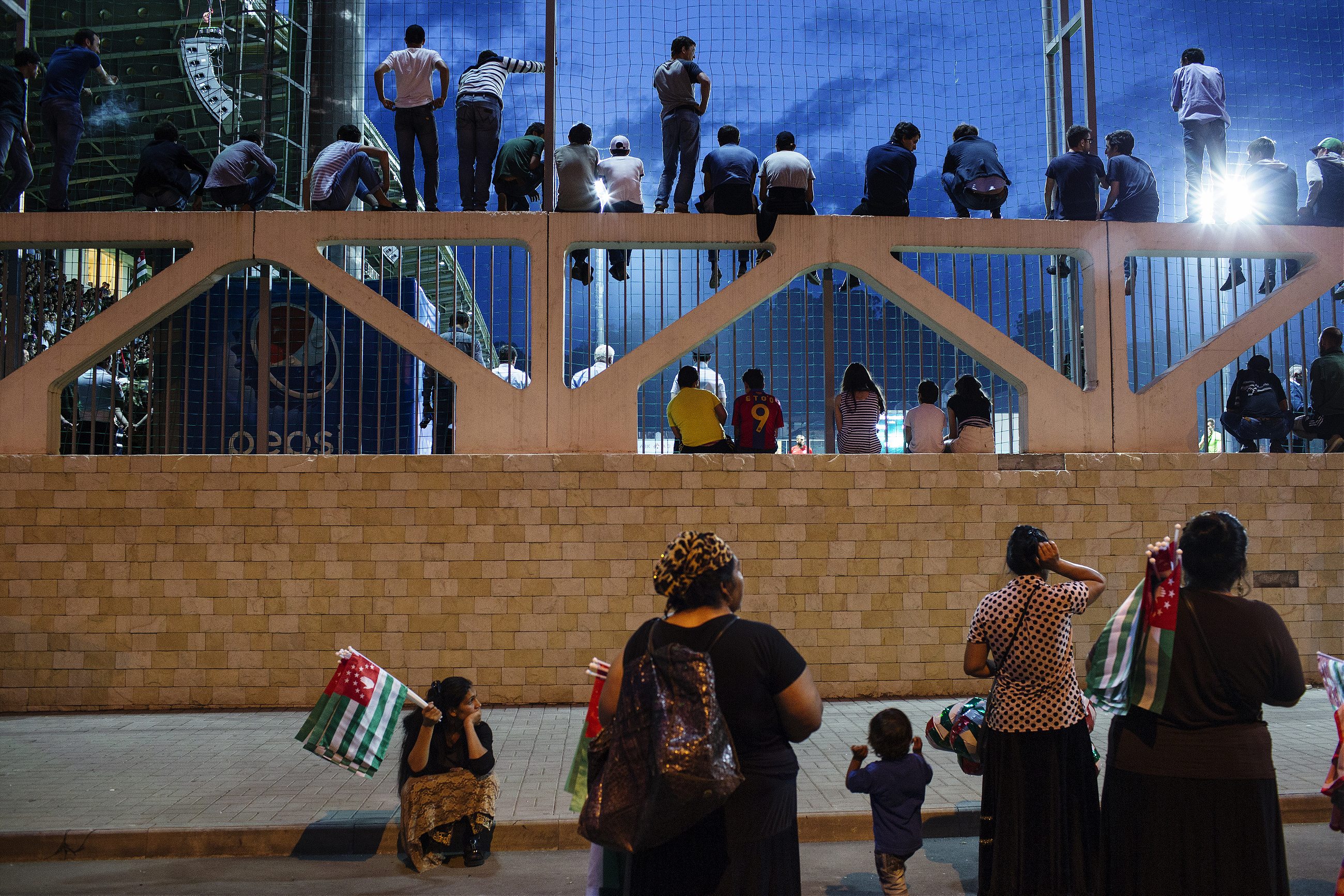
The team representing Somaliland was founded not by that territory’s government, but members of the roughly million-strong Somaliland diaspora. Tall and thin with a shaved head, glasses, and a perpetually laid-back demeanor, 32-year-old Ilyas Mohamed, a civil servant and the team’s director, looks more like a religious scholar than a jock, but he had a passion for the game from a young age. In a roundabout way, it was soccer that reconnected him with his Somali identity.
Mohamed arrived in Britain at the age of seven; he remembers the exact date and still has the shirt he wore that day. “I didn’t hang around with any Somalis at all until I was 18. When I went to the UK, there were only about five families in North London,” he told me. He played on a youth team but his faith prevented him from taking part in the postgame boozing that’s an integral part of amateur-level British football. “I could do the football part, but I couldn’t do the mingling part, which was annoying.” It was then that he started seeking out more Somali friends.
Mohamed said the team’s story began on a trip back to Somaliland a few years ago when he was disturbed by the sight of a child shining a foreigner’s shoes. “Somalis, they’ll respect you as a foreigner more than they’ll respect another Somali,” he told me. “I feel obliged. Somaliland was where I was born. Somaliland has a lot to offer, but it’s got a lot to learn from others.”
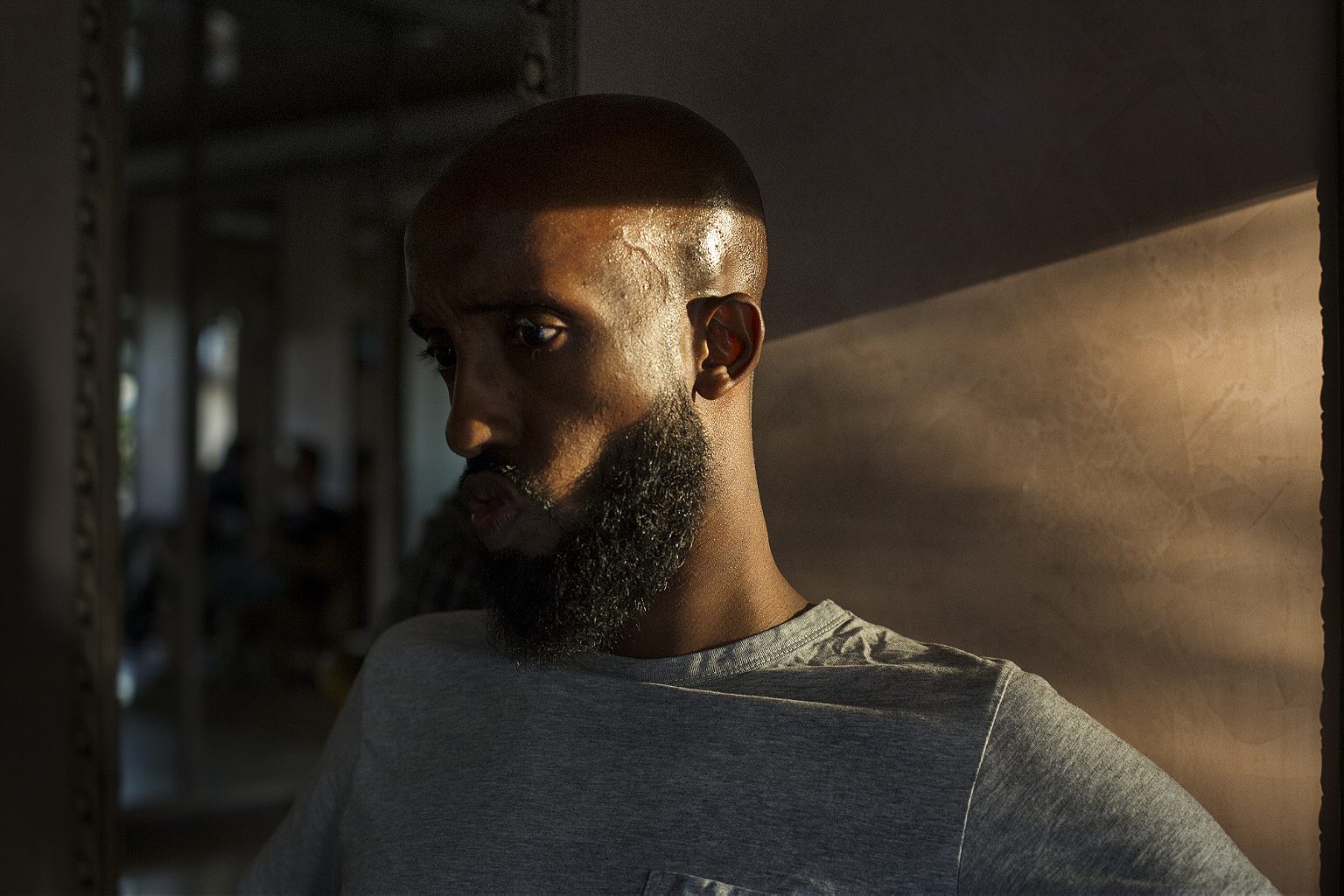
Together with Guled Aden, a 25-year-old PE teacher who now plays on the team, he started a foundation to raise funds for Somaliland youth and organize tournaments for members of the diaspora living in Europe. “Instead of making it a task, why don’t we make something out of our passion, and use that to generate revenue?” Mohamed said. By 2013, their efforts had gotten enough attention that they could pack a proper stadium with British Somalilanders.
The Europeans were nearly all the children of refugees, each with a unique and harrowing story of their family’s journey out of Somaliland. Mohamed recounts the story of his father living homeless on the streets of Paris before he could make his way to the UK and, eventually, apply for family reunification. Guled Egal, a 24-year-old hospital administrator from Bristol, was born in Syria, where his mother had taken refuge before they made their way to Russia and then Norway. Though he now lives in Britain, he’s still a Norwegian citizen.
It was in 2013 that Mohamed connected with Düerkop online. “Sascha was looking on Facebook for Somalilanders who like sports, and no one was responding to him,” he said. “I was monitoring this and I’m thinking. ‘I’m not the man. There’s people out there who are getting paid for this.’” Mohamed directed Düerkop to the Somaliland sports ministry in Hargeisa, capital of the aspiring nation, but there was no response. He and Aden then decided to organize a team themselves, consisting of “the best of the best” Somali players from both the diaspora and Somaliland itself.
The Somaliland team played its first game in London in 2014 against a team representing Sealand, a micronation based on a disused military platform in the North Sea, which resulted in a 2-2 draw. That was followed by a 1-1 draw against the Chagos Islands and a 5-0 victory over Tamil Eelam. Not a terrible record, though Mohamed was still concerned going into Somaliland’s first international tournament, saying that many of the team’s best players had been dissuaded from coming by concerns about traveling to Abkhazia. The team had only 15 players, compared to over 20 for some of the larger teams.
In addition to the Brits, Somaliland was fielding three players from the Netherlands and four from Hargeisa. Many of the players had never met each other, let alone played together, before arrival in Abkhazia. Mohamed had put 4,000 British pounds of his own money into the team in addition to raising funds from friends, family, and Somali business owners in London to pay for equipment, travel costs, and visas, but the team didn’t have the staff or equipment of some of its rivals in Abkhazia.
Based on what he had seen so far from practices, Mohamed didn’t seem optimistic. “Somalilanders really like to keep the ball,” he said. “That can be your downfall sometimes. I told the boys and the coaches, don’t expect miracles in two days.”
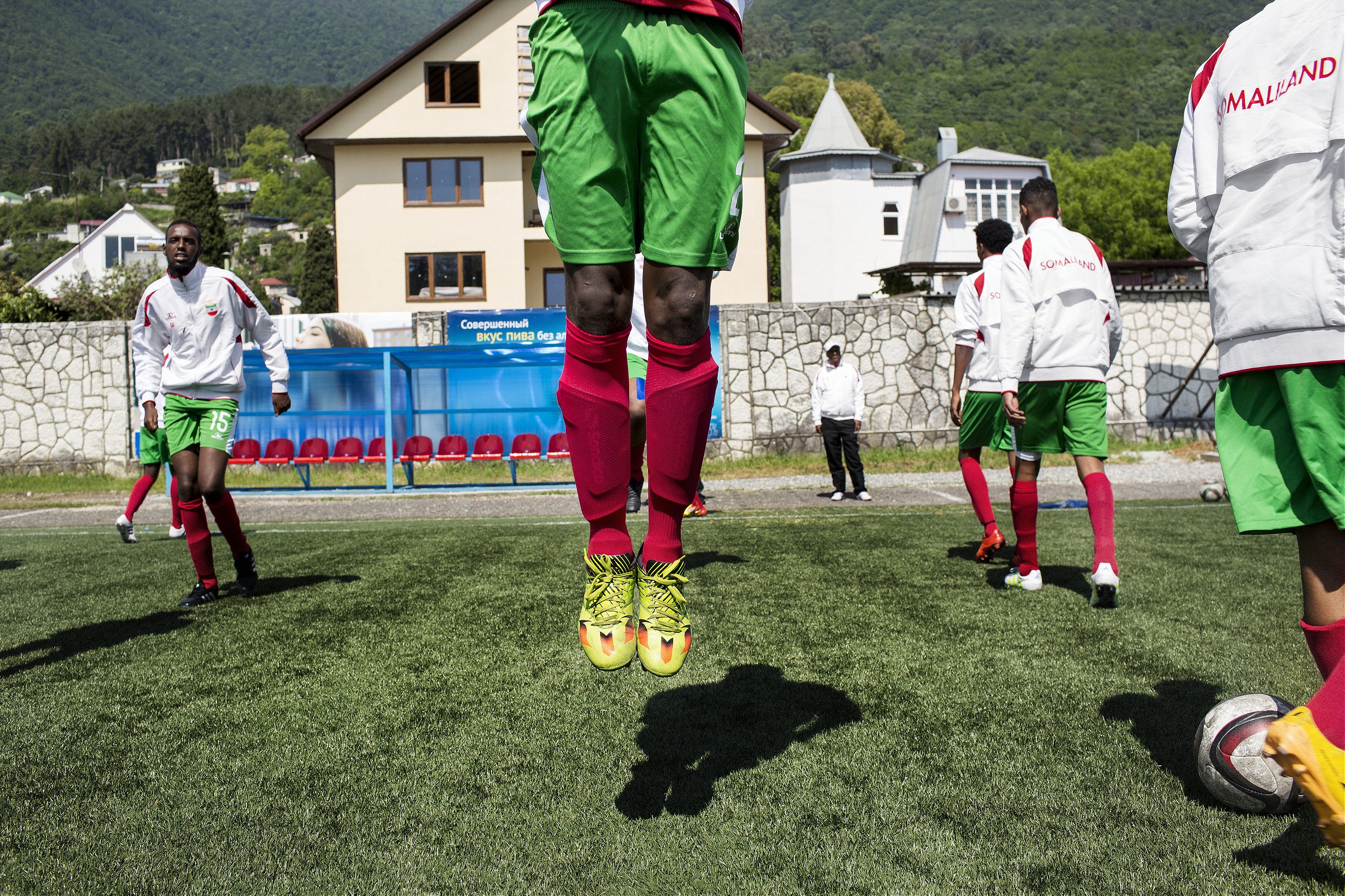
In terms of football, Somaliland is an underdog in a tournament of underdogs. But as a country, it’s more well-defined and constituted than many of its competitors. In the 19th Century, Somalia was divided by European colonial powers. France got what is now Djibouti; the area around Mogadishu became part of Italy’s short-lived North Africa Empire; and Britain colonized what is now Somaliland, largely in order to resupply its garrisons in Yemen. When the British and Italian territories both became independent in 1960, they united in a spirit of nationalist unity. (Both people from Somaliland and the Republic of Somalia self-identify as “Somali.”)
When the country descended into ethnic warfare following the ouster of dictator Siad Barre in 1991, Somaliland’s regional government decided to jump from the sinking ship, declaring its independence on May 18, 1991. It has existed as a stable, though completely unrecognized, state ever since.
This political stability has allowed Somaliland, in a relative sense, to prosper. In contrast to the carnage in Mogadishu, Hargeisa is today described as one of the safest large cities in Africa. The dis-arming of militia groups has been relatively successful. Since an export ban was lifted in 2007, Somaliland has done a brisk trade in livestock with the nearby gulf countries. Multiple flights a day leave from the international airport.
But political recognition has eluded Somaliland, in part because western powers would view this as tantamount to giving up on Somalia’s territorial integrity. This makes it difficult for people from Somaliland to travel on their own passports. Somaliland also remains desperately poor: its GDP per capita in 2014 was just $347, according to the World Bank. In recent years it’s been devastated by drought. It’s a place, in other words, in need of something to cheer for.
For Aden, the ideologue to Mohamed’s organizer, a real national football team is vital to Somaliland’s future as an independent country. “Somalia has been at war for thirty years but they’ve still got a league going on, a premier league kind of thing. Somaliland has been peaceful for 25 years but there hasn’t been a league and there’s only been one stadium, and no one has ever played in it,” he said.
One might wonder why, given all of Somaliland’s challenges, football should be one of the nation’s priorities. “As a youngster, going back to Hargeisa, I used to hang around with the local boys,” Aden told me. “They graduated from school and everything. They wake up, walk around, come back at 12, eat lunch, go to sleep, go back out. There’s nothing to do, nothing to look forward to in the daytime. That’s why I don’t blame them for trying to escape the country. Eighty-nine percent of Somali youngsters don’t work. So if you’re not working, if you’re not playing sports, what other options are there for you?”
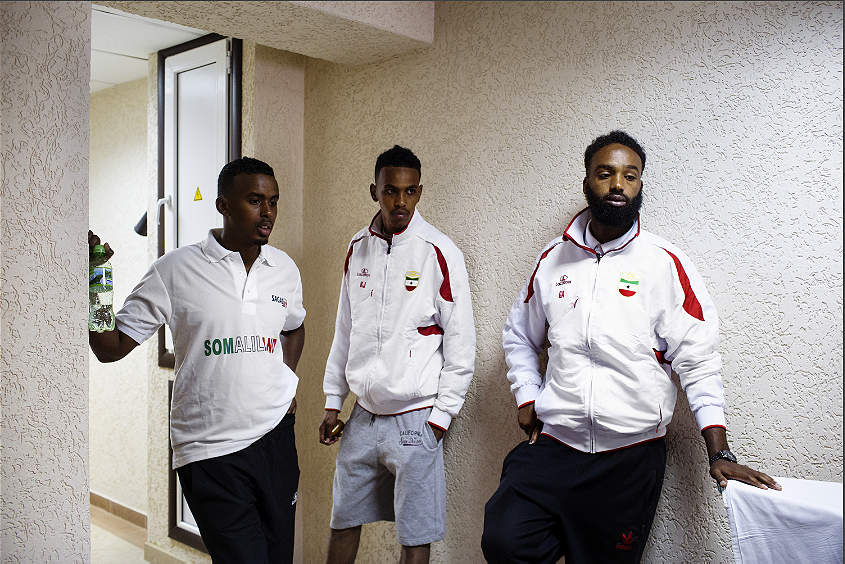
Abkhazia, like Somaliland, is a de facto independent country lacking widespread recognition. A distinct cultural region, Abkhazia existed as a kingdom from the 8th to the 11th centuries. Since then, it has been ruled by Georgia, the Ottoman Empire, and finally the Russian Empire, which forcibly deported tens of thousands of Abkhazians to Turkey. During the Communist Era, it was, confusingly, made an autonomous republic within the Georgian Soviet Socialist Republic. After Georgia split from the Soviet Union, Abkhazia demanded its own independence, resulting in a bloody civil war, which ended in Abkhazia’s de facto autonomy, the killing or displacement of tens of thousands of civilians, and the expulsion of nearly a quarter of a million ethnic Georgians from the territory.
Following the 2008 Russia-Georgia war, Moscow formally recognized the independence of Abkhazia, along with fellow breakaway republic South Ossetia. This was partly a tit-for-tat response to the U.S. recognition of Kosovo over Serbian and Russian objections. But besides Russia, only Venezuela, Nicaragua, and Nauru recognize its independence.
The teams and ConIFA staff traveled to Abkhazia through Russia, crossing at the internationally recognized border just south of Sochi. The Abkhazian authorities, with Russian cooperation, helped them secure visas. Wanting to avoid the considerable hassle and expense of obtaining a multiple-entry Russian visa, I—along with most of the other international reporters covering the tournament—entered via Georgia through the sole crossing at the Inguri River bridge.
The ConIFA Cup may well have been Abkhazia’s opportunity to shine on the world stage
On a gray, blustery Saturday morning, photographer Jason Andrew and I made our way to the crossing—which, from the point of view of the vast majority of the world’s governments, isn’t an international border at all. If Georgia was actively trying to prevent anyone from attending the games, it wasn’t evident from the bored and seemingly drunk officer who gave our passports a cursory look at the roadblock before the border area.
From the checkpoint, it’s about a one kilometer walk to the potholed bridge where Abkhazian-controlled territory begins. As cars aren’t allowed, horse-drawn carriages carry the bags of locals bringing consumer goods into Abkhazia. At the Abkhazian border post, there was an inspection by the Russian security services, followed by an extensive cross-examination by a baby-faced Abkhazian border guard. Though it was all pretty routine, it was hard not to keep in mind that a Georgian man had been fatally shot by guards last month at the crossing under mysterious circumstances. The ConIFA Cup may well have been Abkhazia’s opportunity to shine on the world stage, but that evidently didn’t mean it was taking any steps to make entering the place less of a slog.
While waiting to cross the border, I encountered two middle-aged British football fans carrying almost no luggage. Throughout the week they were the only foreign fans I met, though there were unconfirmed rumors of two Californians floating around. Kevin O’Donovan, a van driver from Cambridge, and Martyn Jones, a retired stevedore from Ipswich, are fans of obscure international football who travel to foreign competitions two or three times a year. “Whatever looks the most unusual,” said Jones. “And where the flights are cheapest,” O’Donovan added. The two had been to games in Pakistan, Lebanon, Thailand, and Sri Lanka.
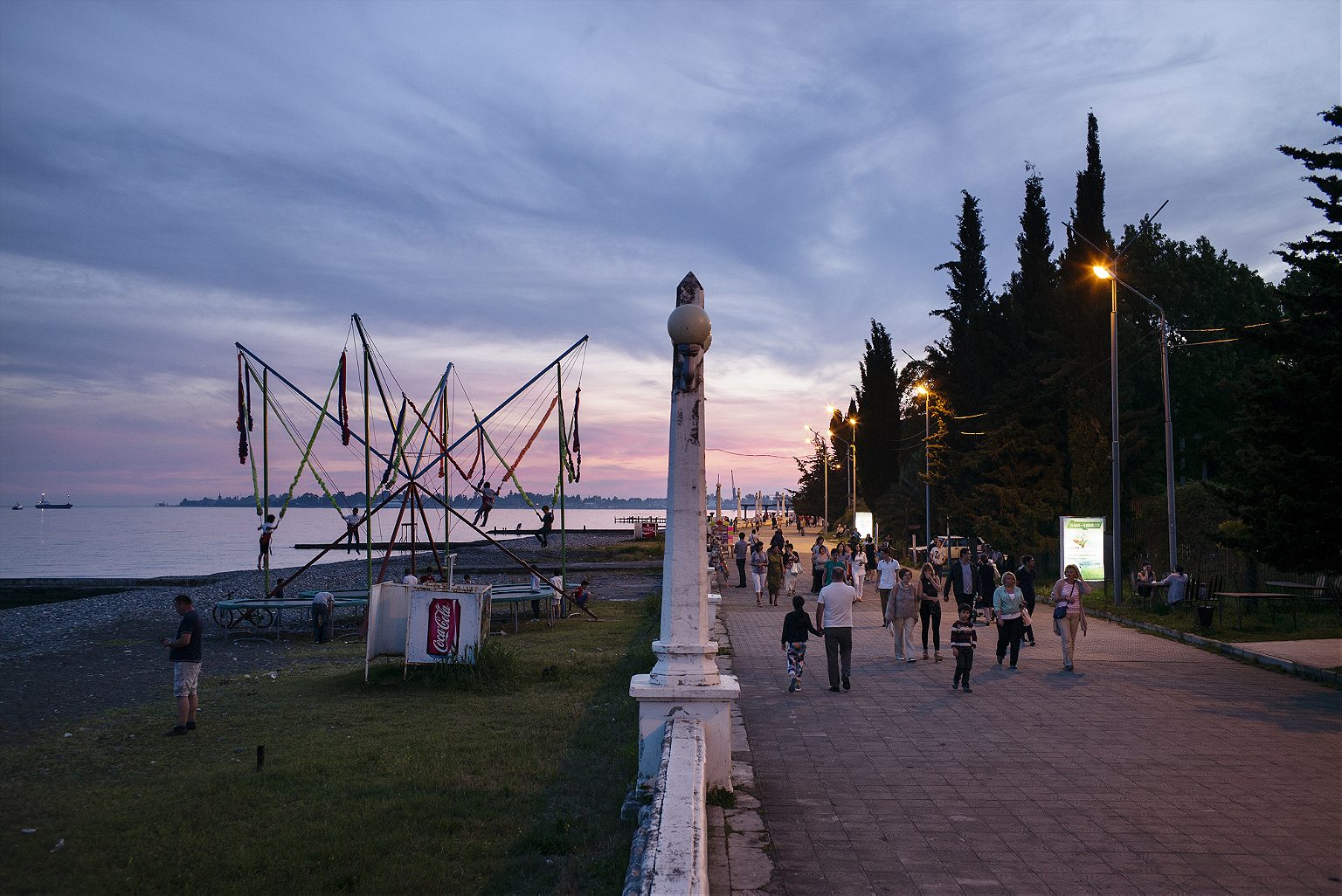
After about three hours at the border, we made our way to Sukhumi, Abkhazia’s capital. Though war and nearly a quarter century of economic stagnation and neglect have left it the worse for wear, the city’s appeal is still apparent, particularly the sea-front promenade dominated by the pre-Soviet Hotel Ritsa. It’s not hard to imagine the thriving seaside resort area that Abkhazia was throughout czarist and Soviet times, though there are still bombed out structures and empty buildings everywhere. The effect is something like if the Jersey Shore were subjected to months of heavy aerial bombardment and then left to decay for twenty years, but people were still vacationing there. Abkhazia is still a popular tourist destination—almost exclusively for Russians, though, for obvious political reasons.
On the night of Saturday, May 28, the twelve participants in the 2016 tournament filed into the newly constructed stadium in Sukhumi for an Olympics-style parade of nations. From the gleaming new facility sitting 4,300 spectators, you could see the hulking remains of Abkhazia’s Soviet parliament building, bombed out during the war and left in ruins as a kind of national symbol. The stadium was a glaring contrast to the crumbling buildings around it, though with its sheet metal and wood paneling, it felt a bit like something assembled from an IKEA kit. As we arrived before the opening ceremony, workers were still painting section numbers on the walls.
Still, it was hard not to be a little inspired by the parade of almost-countries, carrying their flags around the pitch that night, representing an alternate-reality political map—a World Cup for a world that could have been.
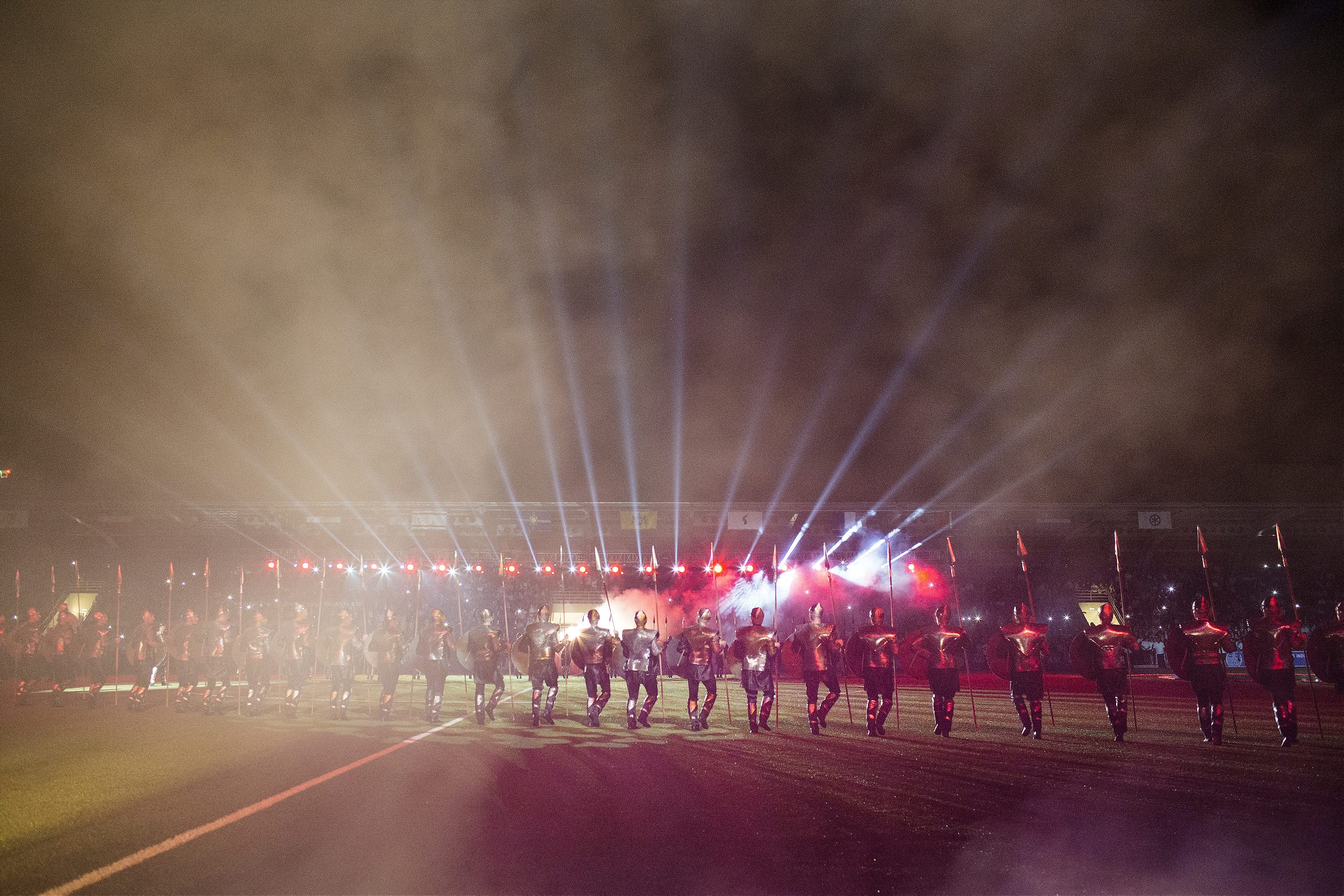
Half the teams in the competition, including Somaliland, were playing their group stage games in Gagra, rather than Sukhumi. Somaliland’s first game was against Sapmi, also known as Lapland, a region inhabited by the Sami minority divided between Norway, Sweden, Finland, and Russia. Subject to discrimination and official efforts to wipe out their language for decades, the Sami have won cultural rights and a degree of self-governance in recent years, with active Sami parliaments in the three Nordic countries.
As the Somaliland team’s bus made its way from the hotel to the game, the previously boisterous and easygoing group fell silent and the atmosphere grew suddenly nervous.
On that damp and rainy Sunday, about 250 local fans had filed into the stands at the local football pitch in Gagra. Though a far cry from the brand new stadium in Sukuhmi, the tournament’s second location provided a far more dramatic backdrop, with the misty Caucasus rising in the distance over the field.
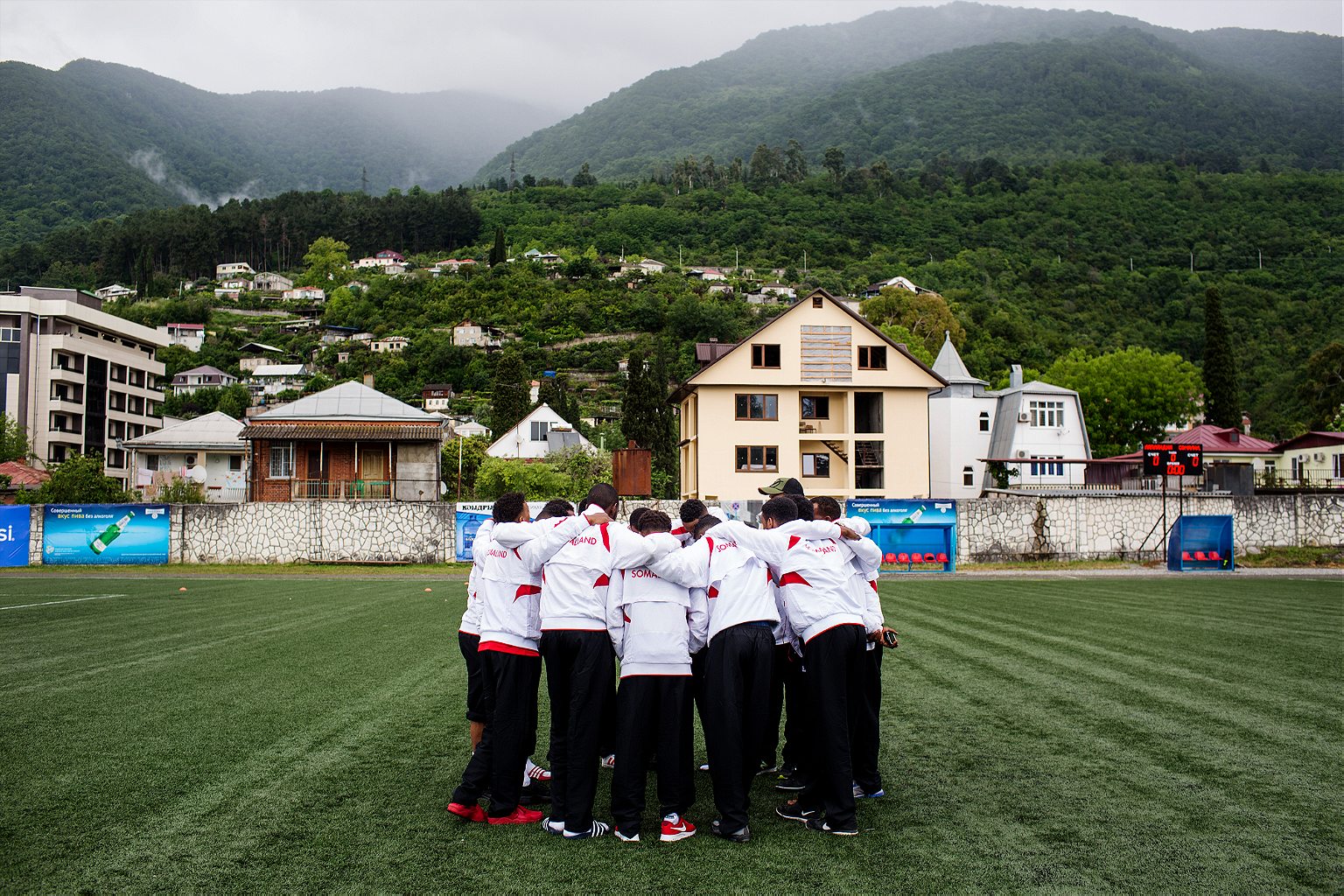
Both teams took the pitch for their respective national anthems, holding hands with local youth players. This, sadly, would be the high point of Somaliland’s afternoon. As soon as the whistle blew, the team’s inexperience playing together showed as they were unable to put together anything resembling offensive plays or coordinated defense. Sapmi’s first goal came around the seventh minute.
At the 20th minute, calamity struck as Somaliland goalkeeper Abdelnasir Dualeh—a 22-year-old semi-professional described by several as the team’s best player—jumped to grab a ball bouncing dangerously near the goal and collided with one of his teammates as well as a charging Sapmi attacker. He collapsed in a heap on the ground and quickly was taken to the hospital. Without Dualeh, Somaliland was outmatched by a team featuring a number of Norwegian semi-pro players and coached by a veteran of Germany’s Bundesliga. The final score was 5-0.
It was in the second half of this game that the “SAH-MAH-LEE” chants began. (The chant may be partly explained by the fact that the digital scoreboard in Gagra cut off the team’s name for the “-land” part.) The crowds, who filled about half the seats, were mostly school kids and teenagers with a few elderly folks and a handful of perplexed Russian tourists mixed in.
Somaliland may have been one of the worst teams at an obscure post-Soviet soccer tournament, but walking the streets with these guys felt like hanging out with Real Madrid, as fans of all ages stopped them to ask for selfies or sign their shirts or arms. “Do you have a sense that the locals really love us more than the other team?” Abdirahim Adan Sultan, a 28-year-old radiography student, asked me on our way to the hospital to check on Dualeh.
I did, and it was clear that this was at least partly the result of the novelty of seeing a group of 20-odd Africans walking the streets of Gagra, a place that gets almost no non-white, or even non-Russian visitors. Most of the time, the fascination was pretty benign. Before the first game, one young Abkhaz boy asked me excitedly if Mario Balotelli was on the team. I was a little sad to disappoint him with the news that the Ghanaian-Italian AC Milan star was not, in fact, taking the pitch that day. Occasionally, the interactions took a darker turn: I heard one Russian reporter ask Aden if the players were all pirates back home.
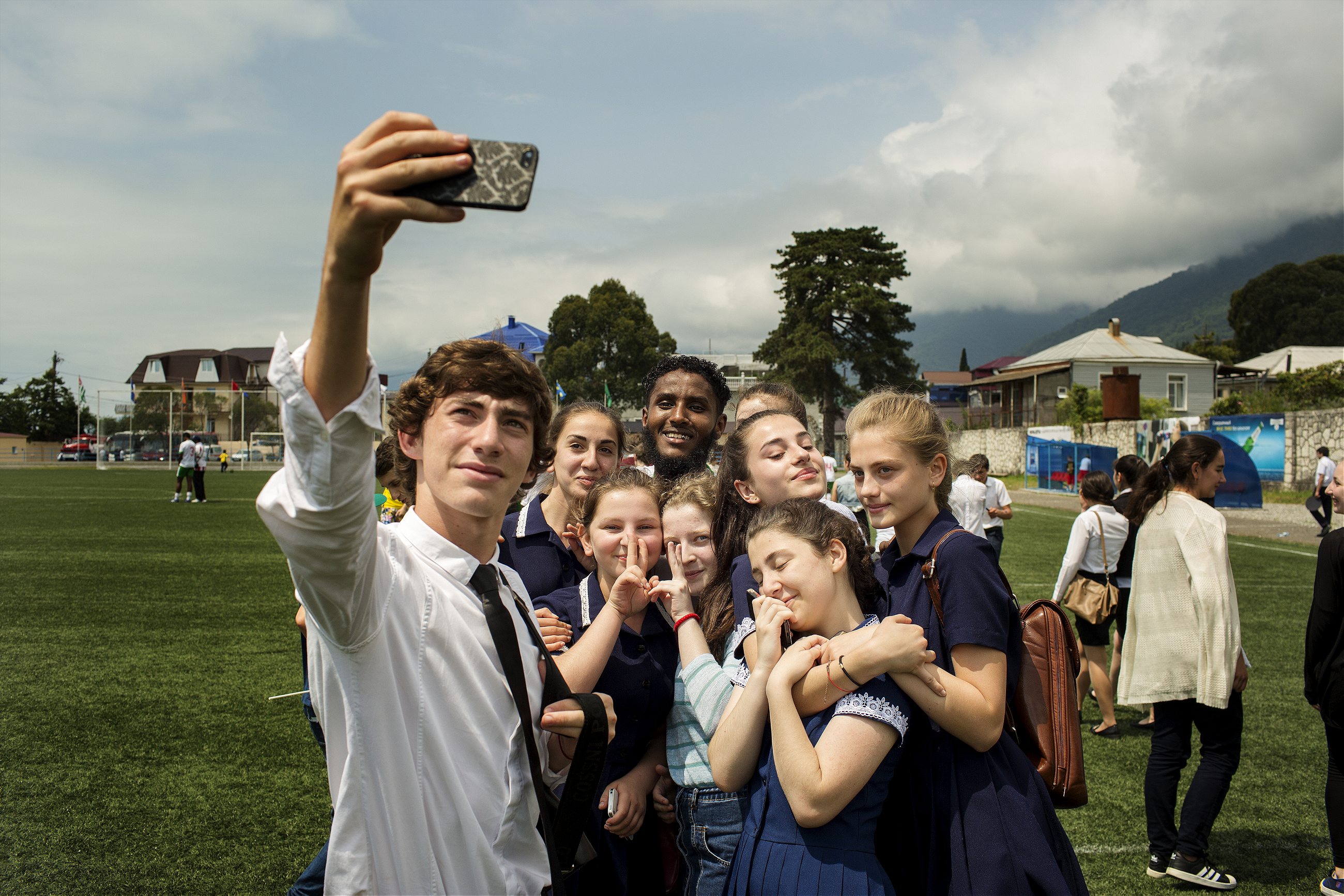
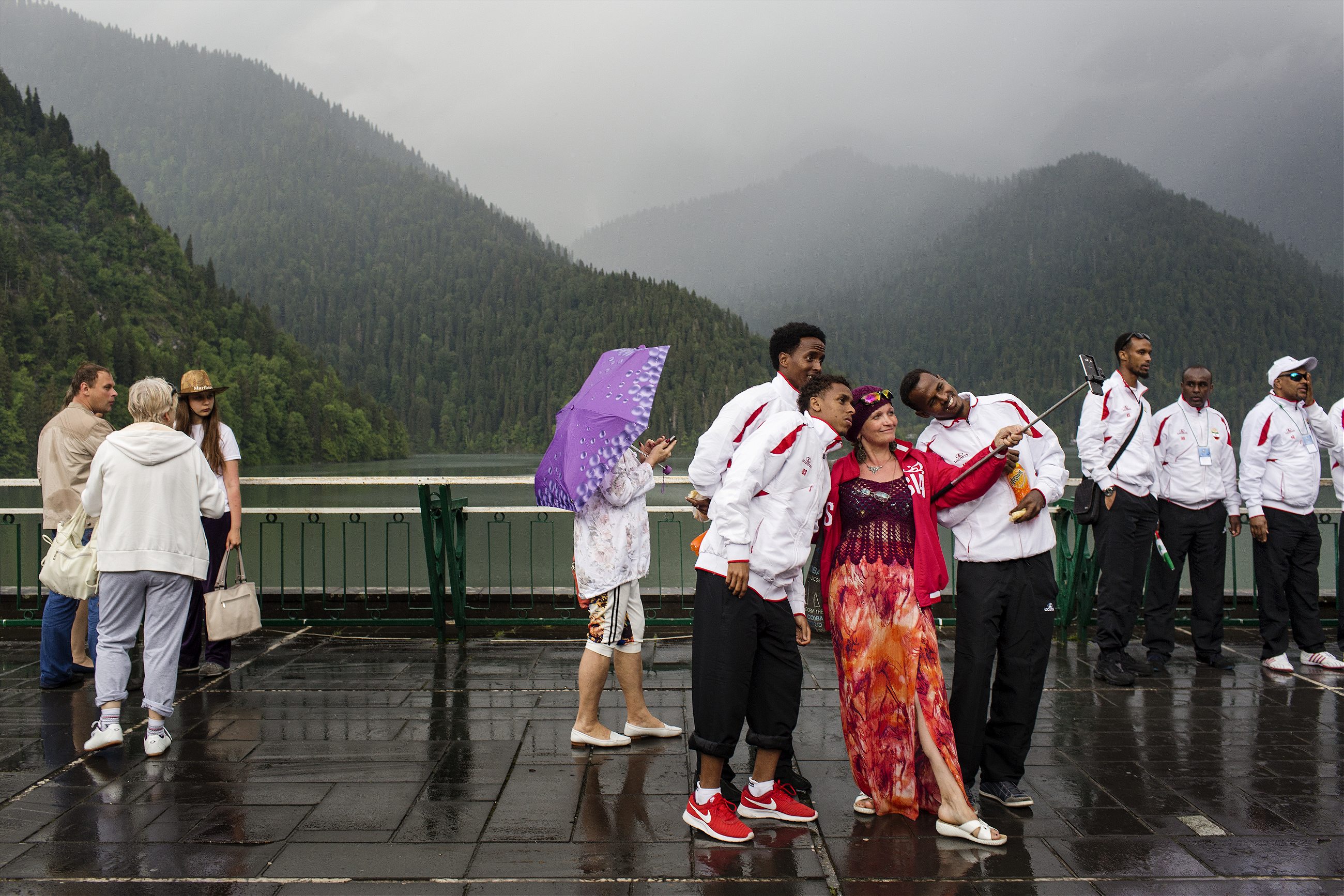
Beyond the novelty of their appearance, it also helped that the Somalilanders were clearly thrilled to be there, generally happier to engage with the crowds and far friendlier to the locals than other teams. “We can’t really communicate, but we talk to them about players like Ronaldo, Messi. Just saying those little words can give you a little spark,” Sultan said.
The players who had made the trip to Abkhazia felt that the warm welcome they had received would convince more Somali footballers to join them next time. Of the players who had decided not to come, Egal said, “After they’ve seen how we’ve been treated here, they [will] regret not coming.”
Still, the lopsided loss wasn’t great news, particularly given the controversy surrounding the team. The Somaliland squad was not only attempting to establish their country’s legitimacy on the world stage; they were fighting for their own legitimacy within Somaliland itself. The Somaliland Ministry of Youth, Sports, and Tourism, which had ignored Düerkop’s requests several years earlier, had disavowed any association with the expat-founded team. “The nation has sports associations such as football, basketball, athletics, etc. So anything out of this system can’t claim to be representatives of the nation,” minister Abdilahi Farah Ahmed told the Somaliland Sun.
The ministry argued that participation in ConIFA would be an insult to Somaliland’s sovereignty. “None of the participants in the tournament has the same legal status or are the same level as we are,” said the ministry’s director general. “Somaliland is not a secessionist state, but it is a country which has reclaimed its sovereignty and independence.” The Somaliland football team is, in essence, the unrecognized team of an unrecognized state.
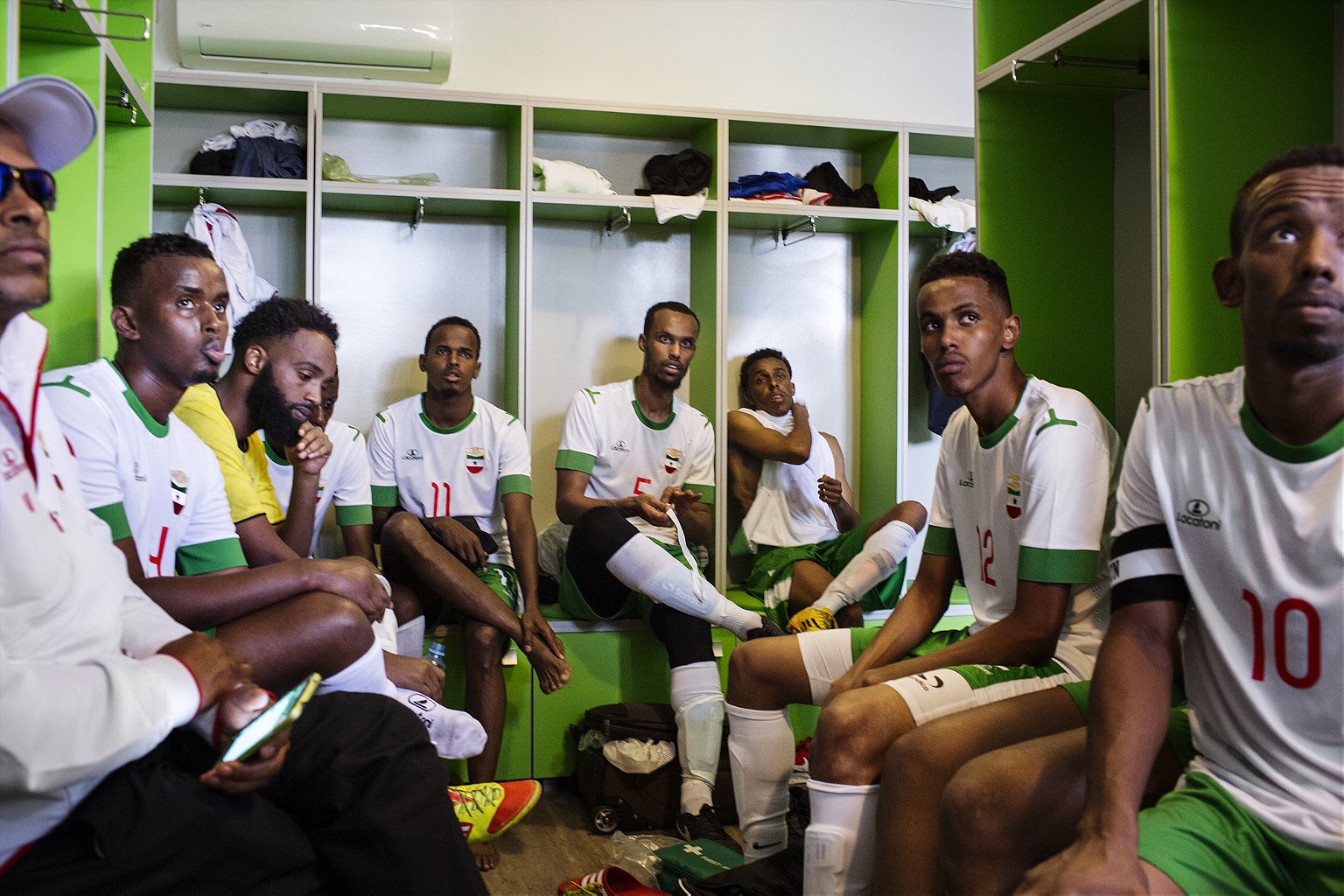
Nonetheless, excitement about the team seemed to be building back home. A video of the Somaliland flag being raised in Gagra, an almost unheard of occurrence on foreign soil, was viewed 21,000 times on Facebook. According to Mohamed, the opening ceremonies were shown in cafes in Hargeisa and the team’s Facebook page got 2,000 new followers on that night alone. “People say we’re not a proper Somaliland Football Federation, but it’s just jealousy,” said the team’s coach, Liban Muse Abdi, a 34-year-old taxi driver from Bristol.
The team wasn’t entirely without official support from Somaliland. The mayor of Hargeisa had given his blessing and funded the travel of the four players coming from Somaliland. They had also sent along Ismail Hirsi, who was referred to by many of the players as “the mayor” or “the governor,” though he is actually a city councilman. Hirsi’s role on the team was a little vague, but he was something between a father figure and a mascot, who could usually be found lounging regally, cigarette in hand, on the steps of the team’s hotel, periodically breaking into a sing-songy chant of his own invention: “Ab-KHA-zia, Ab-KHA-zia.”
“This will awaken a lot of people and act as a catalyst for a change,” Hirsi told me, with Mohamed acting as translator. “Within three years, we will come with a much stronger team. We will have much stronger support to make sure the players that come are the ones who can win.”
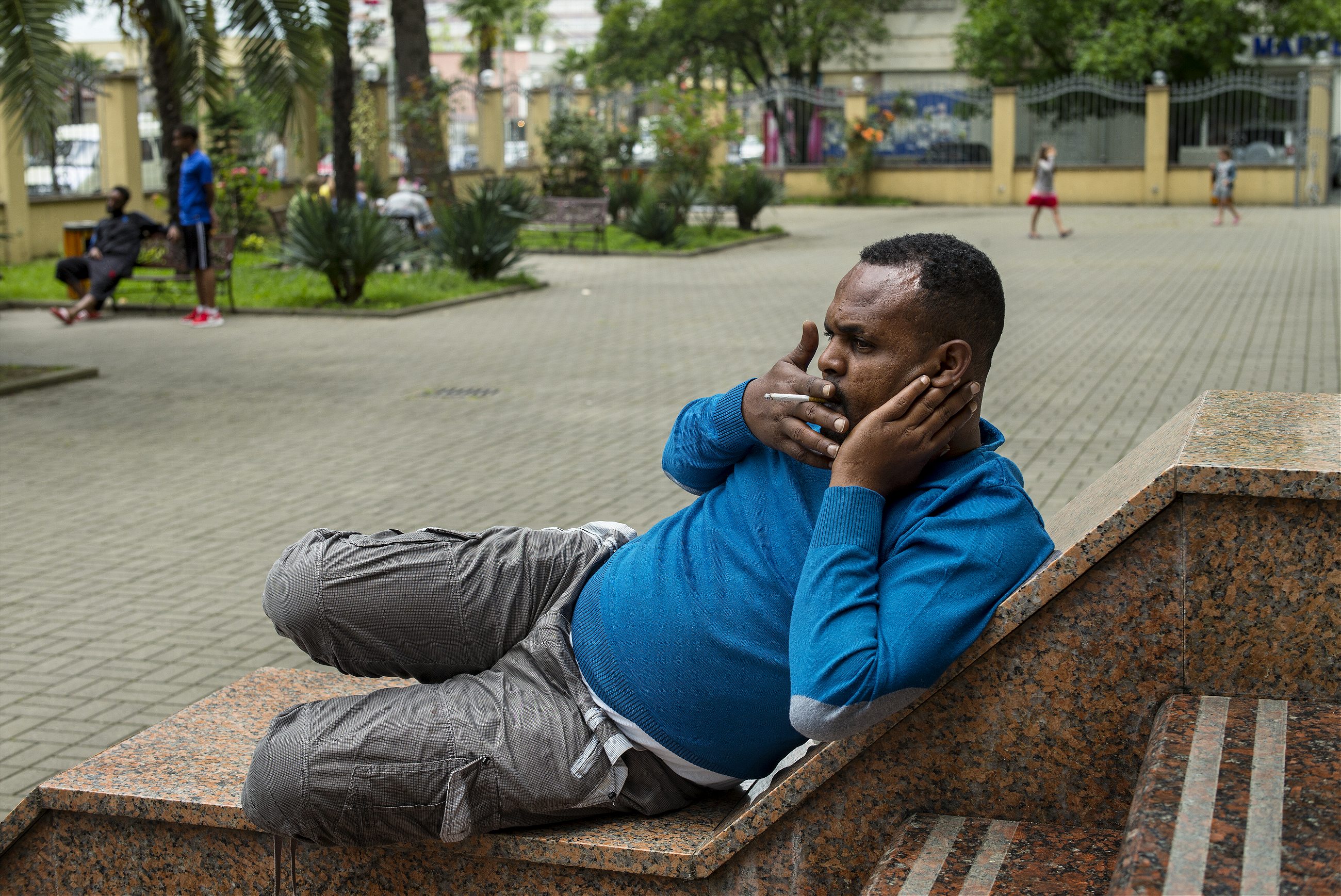
Though I had approached the tournament with a considerable amount of skepticism about ConIFA as an organization, I came away with the impression that it’s a genuine, if slightly naïve, undertaking. If there were any shady dealings going on, they would have to be on a miniscule scale compared to the massive criminality that infects major sports organizations like FIFA.
ConIFA also maintains that it is neutral about the political aims of its members, and doesn’t support or reject any particular member’s claims to political sovereignty. “We challenge political standpoints but we don’t set any,” Düerkop said. “Nobody believes me, but this is not about showing that Abkhazia is an independent country or should be recognized. It’s about giving a platform to the Abkhazian people who exist no matter what the political status is.”
Nonetheless, it was clear that the Abkhazian government was using the attention surrounding the cup to make its case to the world for independence from Georgia. “This tournament gives a great opportunity for all the international visitors in Abkhazia to witness the situation with their own eyes and evaluate what is going on in our country,” said Prime Minister Artur Mikvabia in a press conference. When I asked Mikvabia how much the tournament had cost Abkhazia, he said that the state had spent 25 million rubles (less than $400,000), and, vaguely, that the rest of the funding came from “some donations from certain individuals.” He also said that “we are going to address FIFA with a proposal for membership,” immediately after the tournament.
ConIFA President Blind said he was “100 percent okay” with Abkhazia using the tournament to support its national ambitions. “All hosts all over the world have their own agenda. If you look at the Olympics in Rio, of course the Brazilians want to use that tournament to promote their own country and their own cities. It’s natural.”
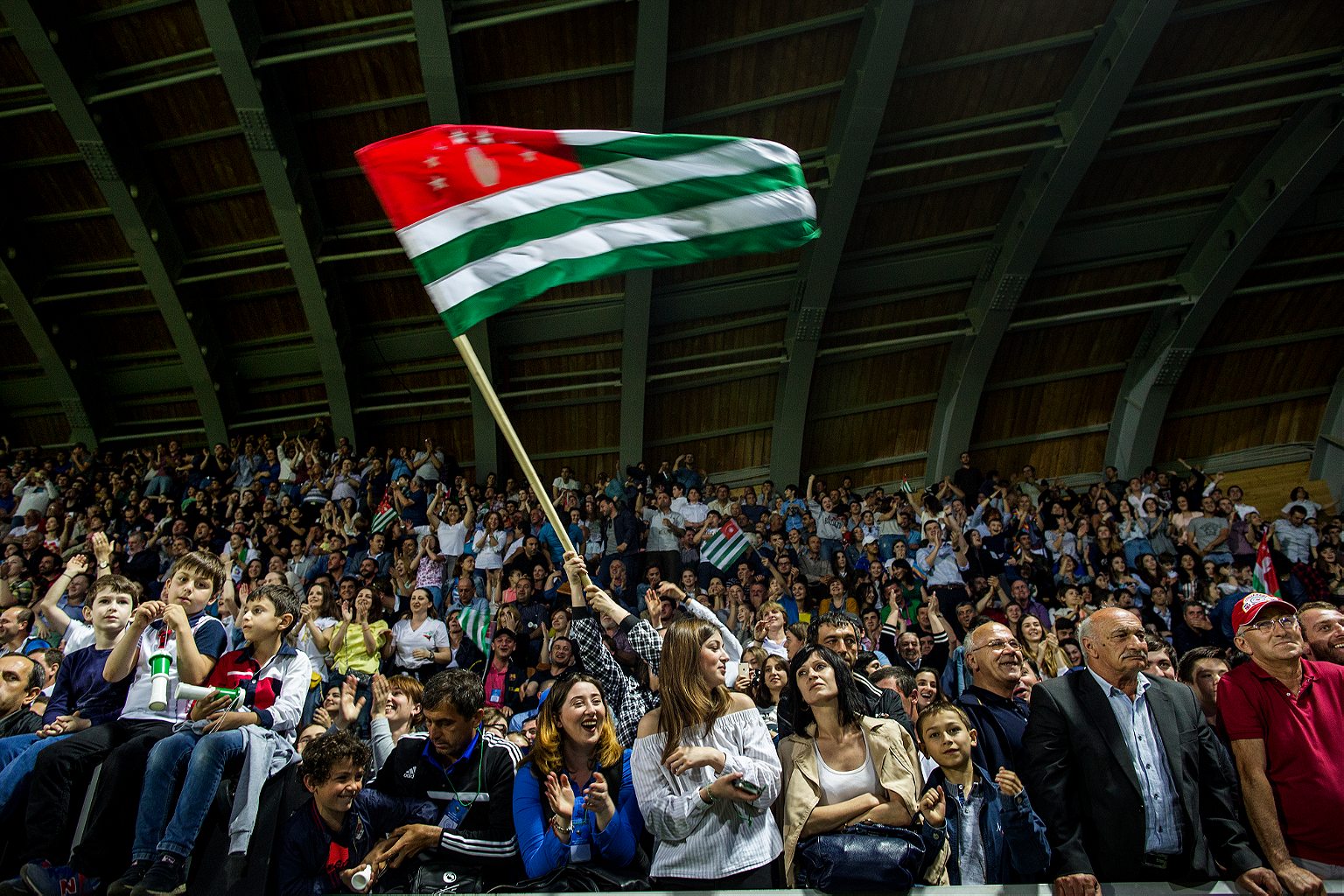
Somaliland’s next game came against Panjab, another team whose players all hail from the UK. The team is the passion project of Harpreet Singh, an intensely driven 33-year-old ex-accountant who has quit his job and poured his life savings into building Punjabi football. Singh takes his inspiration from Panjab’s 19th century Maharaja Ranjit Singh, and aims to use football to build solidarity among the world’s 125 million Punjabis.
Singh, the sort of person who asks you to imagine the hypothetical brutal murder of your own family within 20 minutes of meeting him, explains, “If you ask me now, ‘What is your family?’ My family is all Punjabis worldwide. They are my family. They are more important to me than my own wife and children.”
In contrast to Somaliland, Panjab is a large and disciplined team with a staff that includes an opposition scout, a trainer, and a professional non-Punjabi coach. But despite the disparity, Somaliland was able to hang with Panjab for the first half of their game, playing with much more energy and fluidity than they had against Sapmi. Much larger, physically, and more orthodox in style, the Punjabis seemed flummoxed and frustrated by the free-flowing and improvisatory Somalis, much as chess grandmasters can by stymied by the unexpected moves of an amateur.
“That guy is already shook!” Mohamed shouted from the bench, pointing at one of Panjab’s massive defenders. “This is a much better team than last time and you can see we’re just as good as them. Organization, that’s the difference!”
But in the 30th minute of the game, Panjab scored. In the 38th, Panjab seemed to adapt to the baffling style of play the Somalis were throwing at them, and Somaliland conceded another goal. Sultan took a nasty leg injury. (His teammates later laughed that while lying in delirious pain on the ground, he had said he was willing to “die for my country.”) Midway through the second half, Somaliland’s players seemed to lose all hope and energy, conceding three more goals, for their second straight 5-0 loss. “I’ve got our nickname,” the team’s 23-year-old player-manager Omar Abdillahi said to me after the game. “Five Alive!”
With two wins—they had also beaten Sapmi—Panjab was moving on to the knockout rounds. I asked Singh how he was feeling about the competition coming up. “If you expect nothing from life, you’ll never be disappointed.”
The day after the game, and the day before Somaliland’s unexpected chance at redemption, the team took a field trip to Lake Ritsa, Abkhazia’s most famous landmark and stunningly beautiful even with the requisite tacky crap catering to Russian tourists.
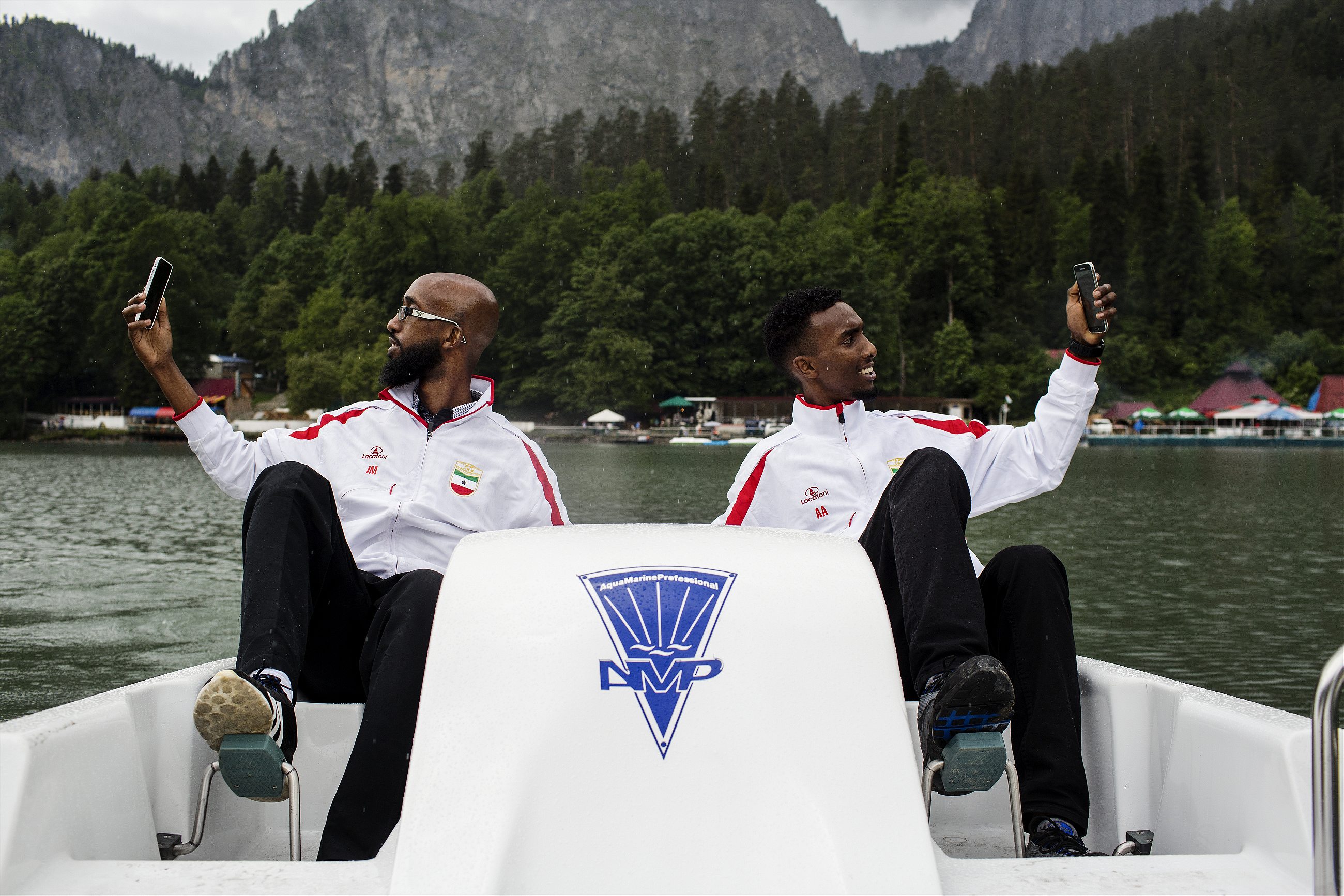
The Somaliland team was a tightknit group, but the international divisions were clear. The vibe on the team bus often felt more North London than Hargeisa. More English than Somali was spoken. British grime rappers like Stormzy and Skepta blasted alongside Drake and The Weeknd. Dualeh acquired the nickname “Abdi Essex,” a reference to the UK reality show The Only Way Is Essex. Cardiff-bred Abdillahi took a lot of shit for his Welsh accent. Abdillahi Nur, a 22-year-old Londoner, was perpetually under-slept, having woken up at 4 a.m. to watch his favorite NBA team, the Oklahoma City Thunder, lose to the Golden State Warriors in the Western Conference Finals.
The “Hargeisa boys” were their own unit and having a very different experience. The visit to Ritsa was the first time they had seen large lakes and rivers. “It’s very different here—the climate, the people. Everything here is beautiful,” said Mohamed Khadar, 26.
Mohamed Abdi Hassan, 28, nicknamed “Govinda” after his favorite Bollywood star, was the top scorer in Somaliland for two years in a row, playing for a team of Hargeisa municipal employees. I asked him what he expected when he got back home. “Inshallah, we hope that people will come to the airport to take photographs and wave Somaliland flags to welcome us home,” he said.
The senior member of the team’s staff, Hassan Abdala, was a bridge between the Europeans and the Somalilanders. Abdala had played for the Somalia national football team from 1977 to 1983. At a competition in Iraq, he “did a runner,” as Aden puts it, leaving the team and traveling to Saudi Arabia. He moved to Norway in 1987 before coming to Britain, where he worked with young Somali players including Mohamed and Aden. He’s been traveling between the UK and Somaliland since 1992 and moved back full time last year to run a football academy. He boasts of building Hargeisa’s first artificial turf field.
Until six months ago, Abdala was a member of Somaliland’s Olympic Committee, a frustrating experience involving continual rejection from the IOC. “When we send applications they reject us, they say we are part of Somalia,” he said. Abdala, who has met before with Somaliland’s president about his football academy, dismisses the controversy over the team’s legitimacy. “All my country is talking about the flag coming here. The president will be very happy,” he said. “One hundred percent everything will change.”
This is a very important moment for us
Somaliland’s third opponent was, by coincidence, yet another of the competition’s three UK-based teams, the Chagos Islands. The British government, which controls the islands, evicted the Chagossians in the late 1960s and early 1970s in order to allow the United States to build a military base on Diego Garcia. Chagossians mostly settled in Mauritius, the Seychelles, and the UK. They continue to petition the British and American governments for the right to return to their home.
Before the game, I witnessed a minor diplomatic incident as the Chagos team discovered that the flag flying at the field in Gagra was that of the British Indian Ocean Territory, rather than the Chagossians’ own flag. The field staff didn’t quite understand the problem until I explained to them that it was the equivalent of a Georgian flag being flown in Abkhazia. The flagpole was bare until the half, when ConIFA staff arrived from Sukhumi with the right flag.
Chagos had had an even rougher group stage than Somaliland, losing its games 9-0 and 12-0, and the two teams had tied at a friendly match back in London. Still, Mohamed wasn’t taking anything for granted, noting that his current team was a lot weaker than the one he had fielded in England. Making things worse, many of the players had given away equipment to fans after the Panjab game, thinking their tournament was done, and had to borrow shin pads from other teams in their hotel.
Mohamed’s skepticism seemed justified in the first half as Somaliland was unable to capitalize on multiple shots on goal and fell behind 2-0. Then, in the 64th minute, the Chagos keeper was out of position with the ball near the goal, and it seemed to just sort of roll in for Somaliland’s first goal of the tournament. As the Chagos keeper started to limp after coming out for an ill-advised header, the streaky team’s energy returned, and Somaliland was able to score two more goals in the next fifteen minutes.
After eight excruciating minutes of extra time—I had lost all journalistic objectivity at this point—the whistle finally blew. “Alhamdulillah,” sighed the injured Sultan on the sideline. Mohamed looked about ready to pass out. Abdala grabbed me by the arm: “This is very important for us.”
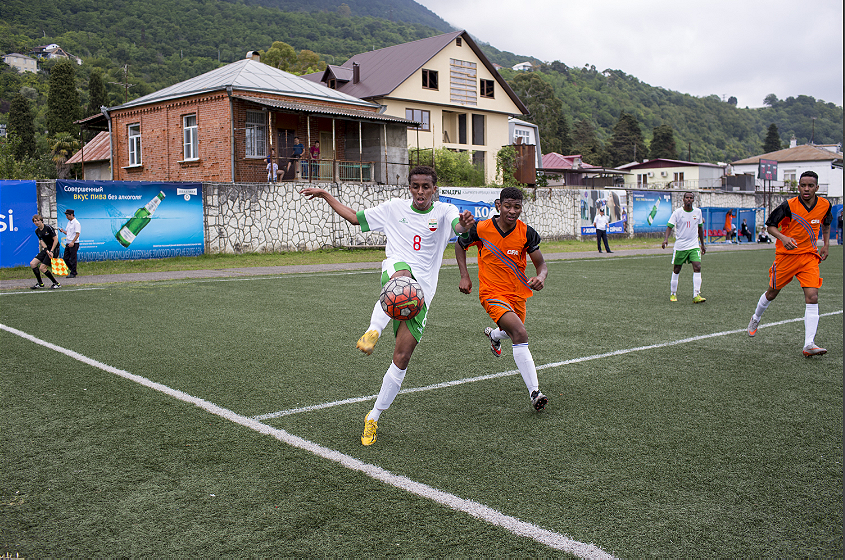
Back in Sukhumi, excitement was building as the home team, Abkhazia—a strong side with several professional Russian-league players—cruised to the finals with victories over Sapmi and Northern Cyprus.
The other big story of the competition was Panjab. Remarkably, the team—assembled almost singlehandedly by Singh a few months earlier, and previously struggling to beat even dysfunctional Somaliland—was only getting stronger. They beat Western Armenia—a team representing Armenians living in Turkey—in a chippy game that ended in a three-way on-field brawl between the two teams and the police. They also managed to beat Padania, an early favorite that had won ConIFA’s European championships in 2015. When I asked Singh how his players were handling the pressure, he responded with another of his patented Harpreetisms: “This is all an illusion.”
I also couldn’t help noticing that even after a few days, the newly built stadium in Sukhumi was looking a little worse for wear. The paving outside was beginning to crack and the paint was starting to fade. For this week, the city had football fever, but I couldn’t help wondering how long it would take for the gleaming new field to start to blend in with Sukhumi’s ruin-porn cityscape.
Ahead of Somaliland’s final game, I caught up again with Jones and O’Donovan, the British fans I’d met at the border. They’d had a harder than expected time getting into games. Tickets were never sold online and the evening games in Sukhumi tended to sell out. (Or more than sell out: at Abkhazia’s first match, the police essentially stopped preventing fans from pushing through the gates and packing the staircases between the seats. In an emergency, the place would have been a deathtrap.) According to O’Donovan, ConIFA had reneged on a promise to give them press passes in exchange for a 50-euro donation. “We don’t want to walk around the pitch and all that bollocks, we just want to sit and watch the football. It’s what we’ve come for. And the beer.”
All the same, the two had been making the most of their time. After a night of drinking chacha, the lethal local moonshine in Georgia and Abkhazia, Jones had awoken to find he had lost his passport. This was my worst nightmare. There are no western embassies in Abkhazia and the State Department specifically warns against travel there. Without my passport, I had no idea how I would have gotten out. “I said to my landlord, ‘I guess I’m staying with you’,” Jones joked. Thankfully, later in the day they got a call from the British consulate in Tbilisi saying someone had found the passport. “The bloke who had it just showed up with it.”
After the Chagos victory, the team had gotten their swagger back
Somaliland’s fourth and final game was against Szekely Land, a team representing Hungarians who, through forces of European history and diplomacy beyond their control, had ended up within Romania.
Though eliminated from contention, the Somalilanders were excited by the prospect of going two-and-two in the competition. After the Chagos victory, the team had gotten their swagger back, particularly Hirsi—“the mayor”—who showed up for the match resplendent in a lime green Somaliland jumpsuit.
In the first half, the Somalilanders were making good passes, communicating on the field, and setting up effective shots. They were up 2-1 at the half on shots that actually looked deliberate, unlike the dribblers that had found their way into the goal against Chagos. For the first time in the competition, they were playing like a team.
In the second half, however, Szekely Land evened the score and the Somaliland squad reverted to form. Players began drifting out of position, communication broke down, and the defense seemed to give up altogether. At this point in the competition, the team was down to just 12 players: one had left early to attend a wedding back home and Aden and Sultan were both injured. Halfway through the second half, Mohamed, who hadn’t played a competitive football game in five or six years, and hadn’t intended to play at all during the competition, strapped on his boots and entered the game. But it was too late at that point: the final score was 10-3.
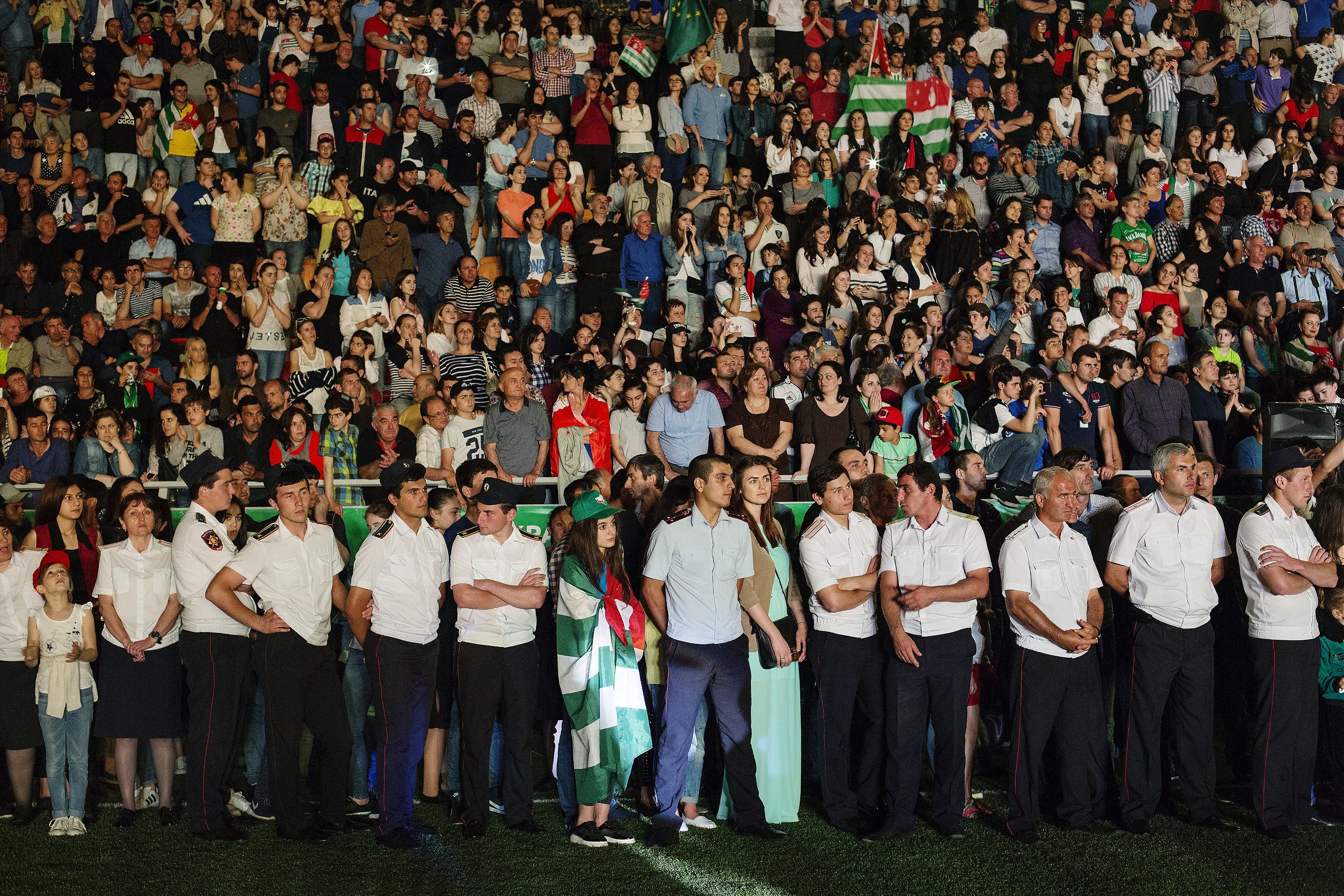
By contrast, the ConIFA final between Abkhazia and Panjab, played before a packed crowd, was a genuine thriller. After a scoreless first half, the baffling Panjab team scored early in the second, but the home team managed to equalize with just two minutes left on the clock, to send the game into a penalty shootout, which then—of course—went to sudden death. When Abkhazia finally won 6-5, the crowd, including the Somaliland team, charged the field.
A place that had had little to celebrate in its nearly 25 years of (disputed) existence erupted in jubilation. Speaking after the game, President Raul Khajimba declared the next day a national holiday. Whatever your views on the thorny ethnic and political divisions of the Caucasus, on that one night in Sukhumi, Abkhazia made its point.
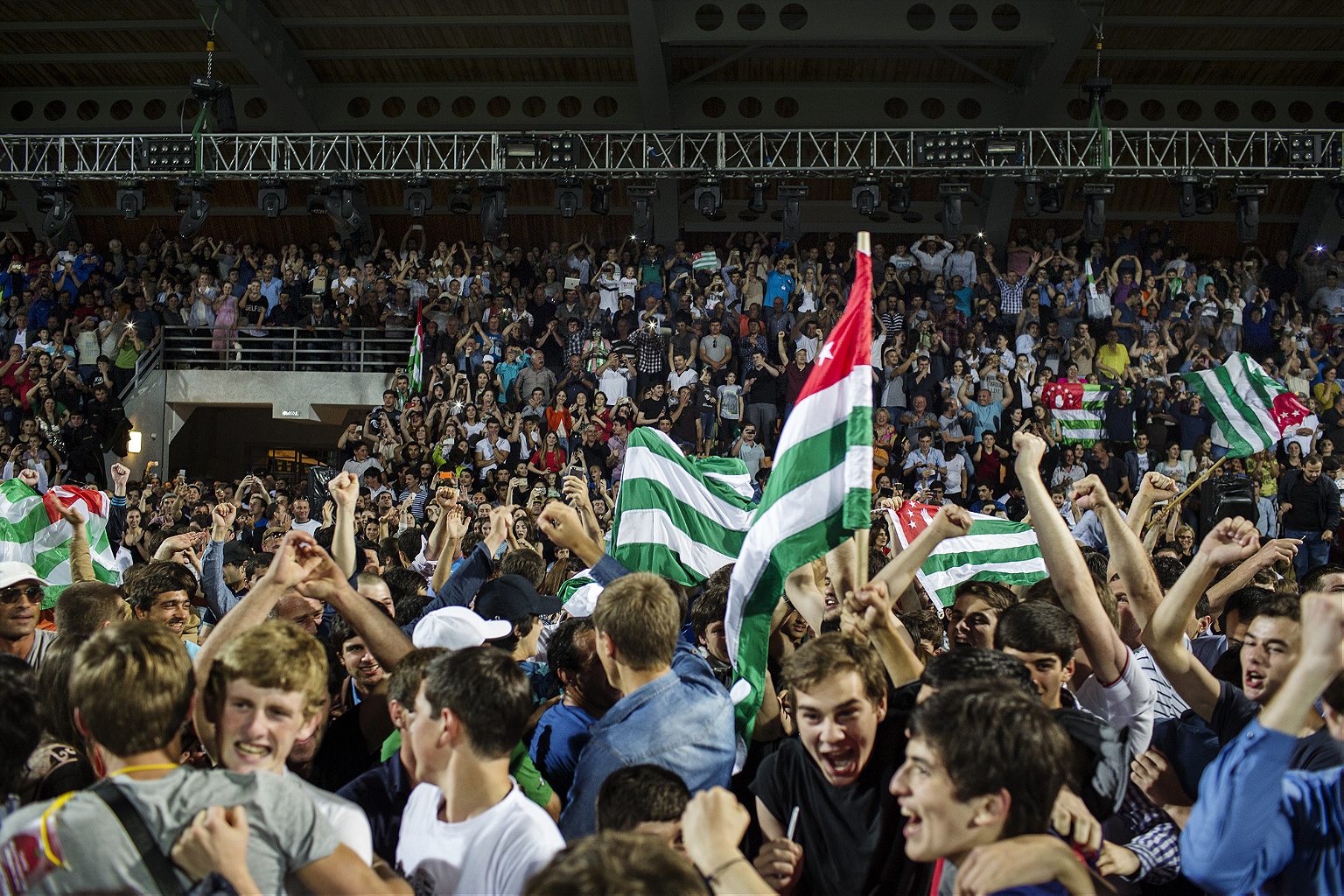
Over the course of the tournament, it occurred to me that the factors needed to build a successful team weren’t that different from those needed to build a country: authoritative, legitimate leadership and a willingness on the part of the people to put the collective over their own self-interest. Like the country they represented, the Somaliland team had pride and identity to spare, but were hampered by questions of legitimacy, disorganization, and a lack of material resources.
“Yeah, there are similarities,” Mohamed said. “In any organization, you need a clear vision. The guys who did the organization, we could have done a lot better. But there are lessons learned and when we get back, we’re going to log it. I think we’ll be a lot better next time, not just football wise but the overall goal to help people who are less fortunate. There’ll be a lot more attention.”
Most international tournaments follow rigid definitions of statehood recognized by the United Nations and Western governments. For all its flaws, what makes ConIFA exciting as an event is that it makes room for more diverse concepts of nationhood—from the traditional nationalist aspirations of Abkhazia to the ethnic preservationism of the Sami, from Chagos’s demands for justice to Singh’s very personal vision for restoring the lost historical glory of Panjab. The Somaliland team was some combination of all of these, representing both an existing political entity’s aspirations for recognition and a cultural diaspora’s desire to reconnect to the homeland their parents left behind.
Recognize it or not, for a week at least, they were a nation.
